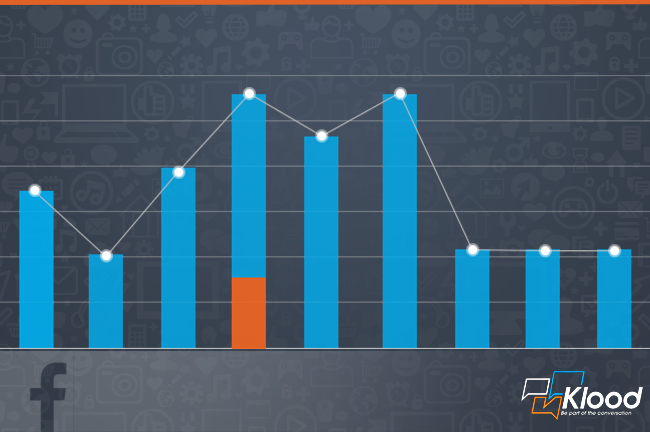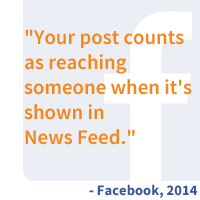
Get weekly
HubSpot updates
Organic reach is quite possibly one of the most over analysed metrics of all time. Many marketers obsess over it to the point that any drop in reach on a single post is likely to spark blind panic and then hours of scrutiny to get to the bottom of ‘why?’ This is also why, when Facebook announced changes in its News Feed algorithms a few months ago , there was uproar.
So, if this sounds like you, then now is the time to stop worrying about reach and concentrate on the metrics that really matter: actions.
Why shouldn’t you focus on reach?
 Don't obsess over your organic reach.
Don't obsess over your organic reach.
Organic reach is essentially the number of people that see your content by simply posting it out on your Facebook page. However, (as has been well reported) this has been in decline for some time now. Why shouldn’t we be overly concerned by this?
Well, it just takes a little understanding of what’s going on.
On average, the typical Facebook user has around 1,500 potential pieces of content they could be seeing in their News Feed, at any given time. That is a vast amount of information and a lot of people vying for one person’s attention.
This is exactly why Facebook doesn’t show you all of this information; it is just too much for a single person to even care about, let alone digest.
Instead Facebook’s News Feed will display around 300 pieces of content out of the 1,500 based on a myriad of factors that are totally unique to each user. For example, if you are someone who is inclined to click on photo posts more than text or video posts, then Facebook’s algorithms will pick this up, recognise you prefer visual content and upgrade photo posts in your newsfeed and downgrade other post types (and vice-versa).
Furthermore, Facebook will recognise which accounts (be that the personal accounts of your friends, brand pages, tv shows etc.) you interact with most and upgrade them in your newsfeed over those accounts you rarely engage with, because it knows that’s what you like. Not to mention the fact that most of your fans don’t login to Facebook and monitor their News Feed all day every day. All of this means there is always a degree of inevitably that some of your fans will simply just miss what you’ve posted. There are, of course, hundreds and thousands of other factors that are all recognised and taken in to account in order to “deliver the right content to the right person at the right time”.
So, what does that mean?
It means that if you are going to be included in that golden 300, your content has to be good. Very good. Consistently good. Good enough that someone will engage with it.
BUT… Even if your content is good (which a lot of content pushed out by marketers isn’t) and people are engaging with it – to use an old cliché – ‘you can’t please all of the people all of the time’.
![]() Just because someone likes your page doesn't mean they want to read everything you post!
Just because someone likes your page doesn't mean they want to read everything you post!
Take Klood as an example, we write about the topics our services focus on; SEO, social media, and email marketing amongst others. However, that means if we push out a blog, for example, on ‘How to advertise on Facebook’, that could be the best written, most informative piece of content we’ve ever produced – a real cracker, but if some of our fans (as they are, in reality) are only interested in SEO or email marketing then the likelihood of them seeing that content is far less than those who routinely read our social focused content. Some people just won’t see it.
The mistake that many marketers make is assuming that just because someone likes your page it means they want to see everything you ever do and post. That’s just not true. Think about yourself. Think about all the friends, pages, tv shows etc. you like on Facebook. Do you want to read everything they ever post? I know I don’t.
Should we care that our content doesn’t reach everyone?
No.
Why?
Because we have to trust that Facebook is doing what it says it’s doing and “showing the right content to the right people at the right time”. If this is the case, and I have no doubt that it’s based on the ever growing user-base and ever crowded News Feed, then the people who want to see your content (and therefore, that you should want to see your content) will see it and that’s all that really matters.
So, what should you be focusing on?
Actions - in other words, likes, shares, comments etc.
Here’s an example from a client’s page recently…
Which would you say was the more successful post?
Post A that had 2 likes
Post B that had 5 likes and 2 shares
What if I told you Post A reached 1,265 people and Post B only reached 140
Sticking with Post B? Good decision.
Reach is a secondary metric that should only ever be considered in conjunction with others, not THE metric that determines success or failure.
The key to successfully marketing your page(s) on Facebook is quality content and by focusing on actions rather than reach, you have a far better indicator of what quality content looks like and how to ensure you’re consistently delivering it. Furthermore, if you achieve actions (and particularly shares) the reach will look after itself – win, win.
The conclusion?
Don’t let reach ruin your marketing. Whether your focus is on ROI or even brand awareness (where you might be a little more forgiven for scrutinising reach) actions are what really matter.
If your target is ROI then fundamentally, you are far more likely to achieve sales through fans that are regularly engaged by what you post. If you can earn trust and loyalty through consistently providing them with valuable, informative content then when it comes time to ask for something (a sale) then you’re chances of converting are much higher.
Similarly, if it’s brand awareness you’re after, actions will increase your reach naturally. If your content is getting a lot of shares then the reach will look after itself.
HOWEVER, as a closing plea, don’t let “achieving actions” be the goal that drives you. Your goal should be “producing quality content that achieves actions”. If you concentrate purely on the former without incorporating the crucial first half of the latter then you’re likely to be heading down a path of trying to game the News Feed with “spammy content” (the trademark of the bad marketer) and that is something that never leads to success.
Let us know your thoughts – what are your goals? What metrics are you focusing on?

